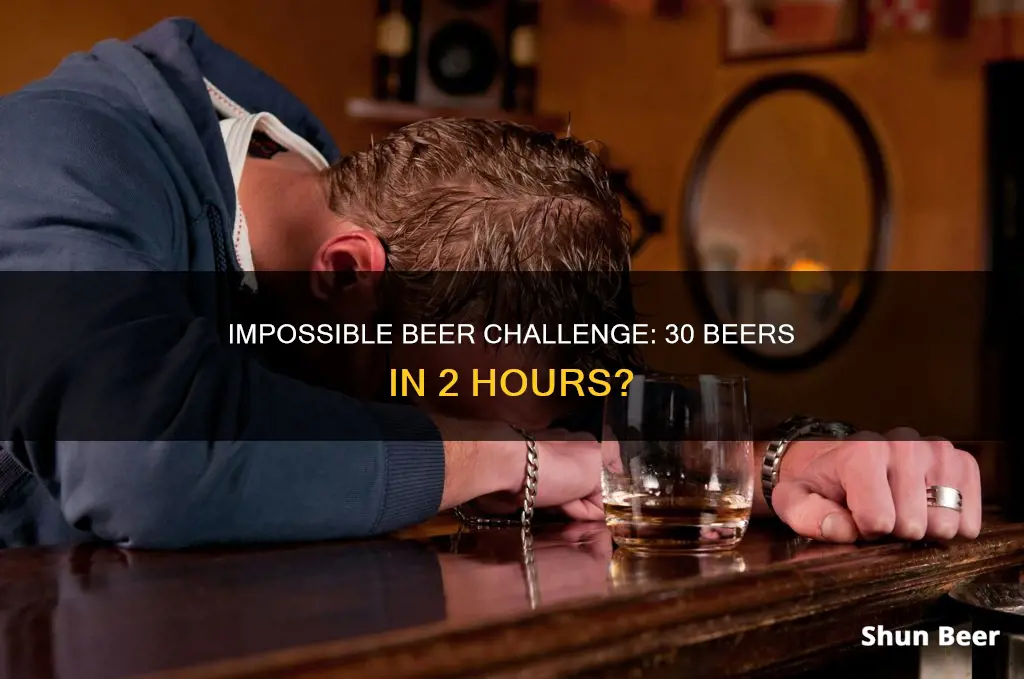
Drinking 30 beers in 2 hours is a dangerous endeavour. The liver, which metabolises alcohol, can only process about one drink per hour. This means that drinking 30 beers in 2 hours would result in a significant accumulation of alcohol in the bloodstream, leading to severe intoxication and a high blood alcohol concentration (BAC). For context, a BAC of 0.30% may lead to a coma, and 0.40% can be fatal. While individual factors such as body weight, metabolism, and tolerance can influence BAC, consuming 30 beers in such a short time would likely result in serious health risks, including the possibility of alcohol poisoning and death.
| Characteristics | Values |
|---|---|
| Number of beers | 30 |
| Time taken | 2 hours |
| Difficulty | Very hard |
| Possibility | Possible but not probable |
| Health impact | High risk of serious health issues |
| Liver's ability to metabolise alcohol | 1 drink per hour |
What You'll Learn

How much beer is too much?
Drinking 30 beers in 2 hours is an extremely dangerous amount of alcohol to consume. It is important to note that drinking large amounts of alcohol in a short period can lead to alcohol poisoning, which can be fatal.
The U.S. Dietary Guidelines recommend that adults who choose to drink alcohol should limit their intake to no more than two drinks per day for men and one drink per day for women. These guidelines are based on a "standard drink", which is defined as 12 ounces of 5% alcohol by volume (ABV) beer. Binge drinking is defined as consuming four or more drinks for women and five or more drinks for men within a few hours, resulting in a blood alcohol concentration (BAC) of 0.08% or higher. Heavy drinking is defined as consuming eight or more drinks per week for women and 15 or more drinks per week for men.
Excessive drinking, which includes binge and heavy drinking, can lead to severe health consequences, including unintentional injuries, violence, risky sexual behaviors, memory and learning problems, chronic diseases such as liver disease and cancer, and a weakened immune system. It is important to note that drinking alcohol during pregnancy is considered excessive use and can lead to miscarriage, stillbirth, or fetal alcohol syndrome.
Additionally, drinking alcohol on an empty stomach can be more toxic as there is no food to help absorb the alcohol, resulting in higher blood alcohol levels. Age, gender, body size, family history, and comorbidities can also impact how alcohol affects an individual.
To reduce the risks associated with alcohol consumption, it is important to drink in moderation, be aware of the alcohol content of your beverage, and know your personal limits. If you are concerned about your drinking or the drinking of someone close to you, it may be helpful to seek advice from a healthcare professional or support groups.
Beer During Lunch: Is It Okay?
You may want to see also

What is binge drinking?
Binge drinking is a dangerous pattern of alcohol consumption that can lead to severe health problems and negative consequences. It is defined as consuming enough alcohol to reach a blood alcohol concentration (BAC) of 0.08% or higher, which typically occurs when a woman consumes four or more drinks or a man consumes five or more drinks within a two-hour period. This threshold varies slightly with age and size, with younger people requiring fewer drinks to reach the same BAC.
Binge drinking is a widespread issue, with about one in six adults in the United States engaging in this behaviour at least four times a month. It is more common among men and younger adults (aged 18-34), with men being twice as likely to binge drink as women. Binge drinking is also prevalent among college students, with nearly half of full-time students reporting binge drinking in the past month.
The immediate effects of binge drinking include poor motor control, slower reaction times, and a shorter attention span. It also increases the risk of injuries, violence, unsafe sexual behaviour, and unintended pregnancy. Additionally, it can lead to alcohol poisoning, which can be life-threatening. Over time, binge drinking can cause mental health issues, loss of brain volume, a weakened immune system, and an increased risk of several types of cancer.
Binge drinking is associated with a high economic cost, with an estimated three-quarters of the $249 billion cost of excessive alcohol use in the United States in 2010 being attributed to binge drinking. It is also a major cause of death, with about one-third of the approximately 178,000 deaths from excessive alcohol use in the United States each year being linked to binge drinking.
To reduce the risks associated with binge drinking, it is recommended to limit alcohol consumption to no more than one drink per day for women and no more than two drinks per day for men. It is also important to consume alcohol with food and to alternate alcoholic drinks with non-alcoholic ones, especially water. Additionally, it is crucial to drink in a safe environment and to plan ahead for a safe way home.
Drinking Beer While on Celexa: What You Need to Know
You may want to see also

What are the health risks of drinking 30 beers in 2 hours?
Drinking 30 beers in 2 hours is classified as binge drinking. Binge drinking is defined as consuming a large amount of alcohol in a short period, resulting in a blood alcohol concentration (BAC) of 0.08 g/dl or higher. This amount of alcohol in a short time frame can have serious health risks and negative consequences.
Health Risks
Drinking 30 beers in 2 hours can cause alcohol psychosis, also known as alcohol hallucinosis, which includes symptoms such as hallucinations and delusions. While this condition is relatively rare, it can occur during or shortly after heavy alcohol consumption.
Accidents and Injuries
Binge drinking increases the risk of accidents and injuries, including falls, burns, and car crashes. Alcohol impairs thinking abilities and coordination, making it more likely for individuals to sustain traumatic injuries.
Liver Disease
The liver is responsible for metabolizing alcohol, and heavy drinking can take a toll on its function. Alcohol can kill liver cells, leading to scarring (cirrhosis) and alcoholic fatty liver disease, which indicates that the liver is not functioning optimally.
Pancreatitis
Alcohol causes the pancreas to produce toxic substances, which can lead to pancreatitis, a dangerous inflammation of the pancreas that causes swelling, pain, and impaired enzyme and hormone production for digestion.
Cancer
Chronic heavy drinking increases the risk of developing alcohol-associated cancers, including head and neck cancer, esophageal cancer, and breast cancer. Even one drink per day can increase a woman's risk of breast cancer by 5% to 15%.
Immune System Dysfunction
Heavy drinking can negatively affect the immune system by decreasing the number of immune cells and increasing the risk of infections. Chronic drinkers are more susceptible to diseases like pneumonia and tuberculosis.
Brain and Nervous System Damage
Alcohol interferes with the brain's communication pathways, affecting mood, behaviour, clear thinking, and coordination. Heavy drinking can also cause mental health issues such as depression and dementia, as well as painful nerve damage that may persist long after the drinking episode.
Heart Disease and Cardiovascular Problems
Consuming large amounts of alcohol in a short period can damage the heart and lead to cardiovascular issues, including cardiomyopathy, arrhythmias, and high blood pressure.
Ulcers and Gastrointestinal Issues
Excessive alcohol consumption can result in digestive problems, including heartburn, acid reflux, and inflammation of the esophagus, stomach, and intestines.
Malnourishment and Vitamin Deficiencies
Heavy drinking can lead to poor dietary choices and inefficient nutrient metabolism, resulting in malnourishment and vitamin deficiencies. Alcohol can also cause internal bleeding, which may contribute to the development of iron deficiency anemia.
Osteoporosis
Alcohol negatively affects bone health and increases the risk of osteoporosis, a condition characterised by decreased bone density that makes bones more fragile and prone to fractures.
It is important to note that these health risks may vary based on individual factors such as genetic factors, gender, body mass, and general health.
Mixing Beer and Acetaminophen: What You Need to Know
You may want to see also

How much time is needed to sober up after drinking 30 beers in 2 hours?
Drinking 30 beers in 2 hours is an incredibly dangerous amount and would result in an extremely high blood alcohol concentration (BAC). To put this into context, a BAC of 0.08 is considered the legal limit for driving in most U.S. states, and a BAC of 0.40 or higher can lead to respiratory failure and death.
Assuming the beers in question are regular 12-ounce beers with 5% alcohol by volume (ABV), 30 beers would contain 60 ounces of alcohol. This would far exceed the recommended limit for men and women, and the amount consumed would be considered excessive drinking and binge drinking.
The time required to sober up from drinking 30 beers in 2 hours would depend on various factors, including the individual's body weight, liver function, sex, and the amount of food consumed. On average, the body can metabolize one standard drink per hour, but this rate may vary.
Given the high number of drinks consumed, it would likely take many hours for the body to fully metabolize and eliminate the alcohol. It is important to note that drinking such a large quantity of alcohol in a short period can lead to severe intoxication, loss of consciousness, and even death. Therefore, it is crucial to seek medical attention if experiencing any negative symptoms after excessive drinking.
To promote sobering up, it is recommended to drink plenty of water, eat food, and get plenty of rest. However, it is important to note that there is no quick fix to sober up, and the body needs time to process and eliminate the alcohol.
Beer and Workout: A Healthy Mix?
You may want to see also

What factors affect how quickly a person will become intoxicated?
Consuming 30 beers in 2 hours is a lot, and it will likely lead to intoxication and serious health risks. Let's look at some factors that affect how quickly a person will become intoxicated.
Weight and Body Composition
An individual's weight and body composition play a significant role in how quickly they become intoxicated. Generally, people with a higher body fat percentage will take longer to get drunk compared to those with a lower body fat percentage. This is because alcohol distributes itself throughout the body's water content, and individuals with a higher body fat percentage tend to have a lower water content.
Sex
Men and women process alcohol differently due to differences in body composition and the enzymes that metabolize alcohol. Women tend to have lower body water content and higher amounts of alpha-glycerol phosphate, an enzyme that slows down the metabolism of alcohol. As a result, women may become intoxicated more quickly than men, even when consuming the same amount of alcohol.
Food Consumption
Drinking alcohol on an empty stomach increases the rate of absorption, leading to a higher blood alcohol level. Eating a meal before drinking can help slow down the absorption of alcohol into the bloodstream, giving the body more time to metabolize it.
Rate of Consumption
The speed at which a person consumes alcohol also affects how quickly they become intoxicated. Drinking large amounts of alcohol in a short period will lead to a higher blood alcohol concentration, resulting in faster intoxication.
Alcohol Content of the Beverage
The alcohol content of the beverage, often listed as Alcohol By Volume (ABV), directly affects how quickly a person becomes intoxicated. Beverages with higher ABV will lead to faster intoxication compared to those with lower ABV.
Metabolic Rate
People with faster metabolic rates may process alcohol more quickly, delaying the onset of intoxication. However, metabolic rates can vary widely between individuals, depending on factors such as liver size, body mass, and genetics.
Medication and Health Conditions
Certain medications and health conditions can also affect how quickly a person becomes intoxicated. For example, medications that interact with alcohol can increase its effects, leading to faster intoxication. Additionally, individuals with liver disease or other medical conditions may process alcohol differently, impacting the rate of intoxication.
It is important to note that the factors listed above can vary from person to person, and the effects of alcohol can be unpredictable. It is always essential to drink responsibly and be aware of personal limits to avoid serious health risks associated with excessive alcohol consumption.
Beer and Wisdom Teeth: Safe Drinking Timeline?
You may want to see also
Frequently asked questions
Yes, drinking 30 beers in 2 hours can be extremely dangerous and life-threatening. The liver, which is responsible for metabolizing alcohol, can only process about one drink per hour. Consuming alcohol faster than this rate can lead to a dangerous accumulation of alcohol in the bloodstream, resulting in severe intoxication and potentially fatal consequences.
Several factors influence the rate of intoxication, including gender, mood, food consumption, drinking speed, tolerance, physical condition, medication, carbonation, and altitude. These factors can impact how alcohol is absorbed, distributed, and metabolized in the body.
Severe intoxication is characterized by a need for assistance in walking, mental confusion, dysphoria, nausea, vomiting, loss of consciousness, and the brink of coma. It is important to seek immediate medical attention for individuals exhibiting these symptoms.
Excessive beer consumption over an extended period can have detrimental effects on health, including unintentional injuries, violence, memory and learning problems, early dementia, chronic diseases such as liver disease and cancer, malnutrition, weakened immune system, depression, and anxiety. It can also negatively impact personal and professional life, leading to decreased productivity, job loss, financial issues, and relationship problems.







